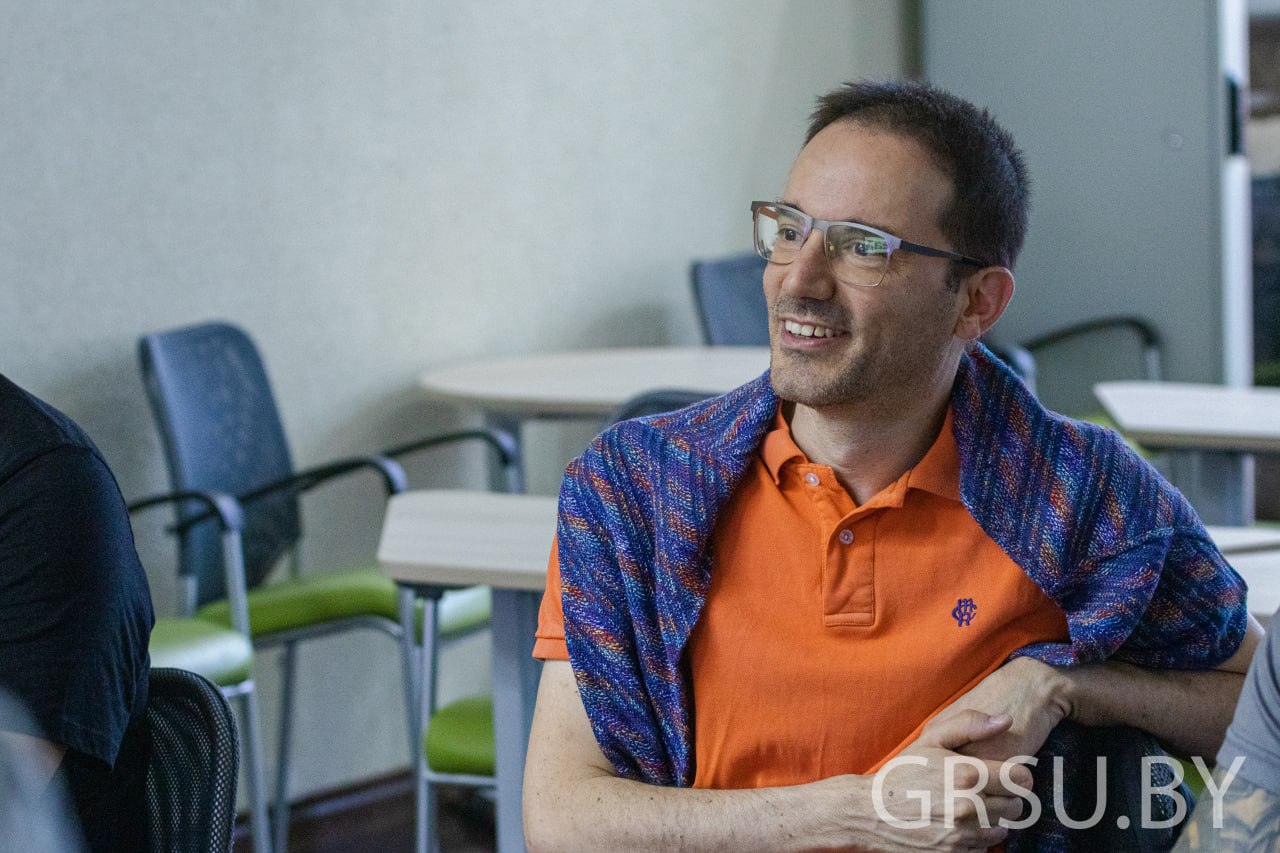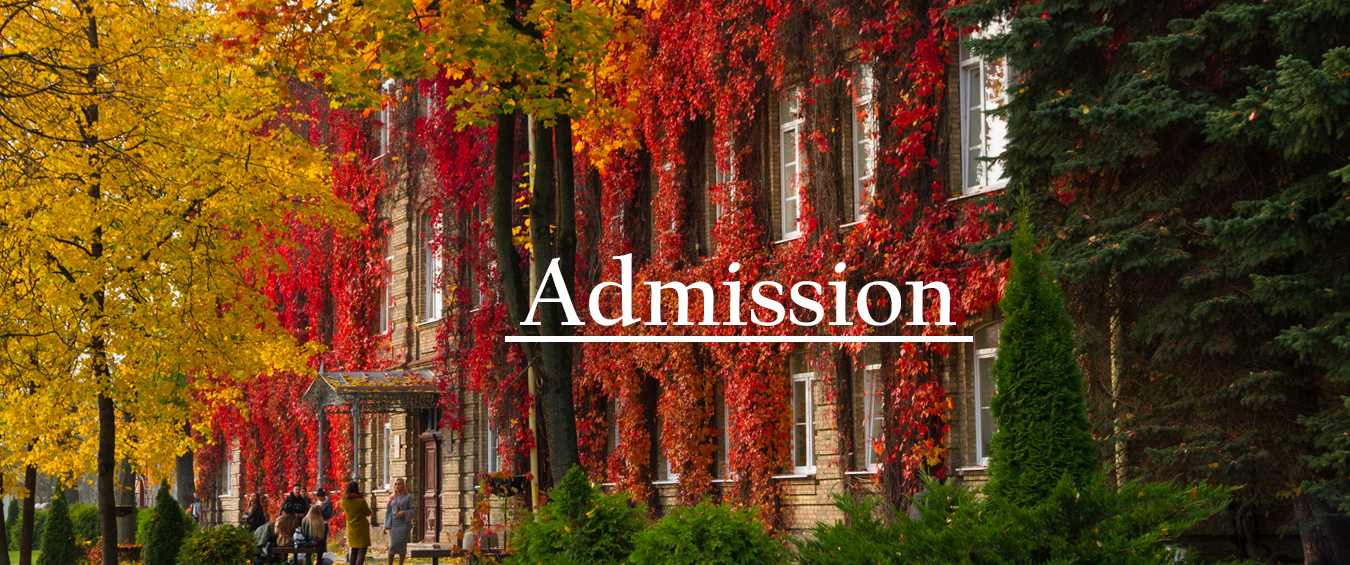
Yanka Kupala
State University of Grodno
ГАПОНИК МАРК ГЕННАДЬЕВИЧ
Yanka Kupala State University of Grodno has launched a Summer school of the Russian language

Participants from China, Italy, New Zealand and Poland will study Russian for two weeks at Yanka Kupala State University of Grodno.
The summer school of the Russian language of Yanka Kupala State University of Grodno is held on the basis of the Faculty of pre-university training. Summer School is a great opportunity to combine language learning with acquaintance with modern Belarus and its traditions.
This year, foreign guests will be trained from July 31 to August 12. Traditionally, master classes on making Belarusian souvenirs and cooking Belarusian cuisine will be organized for Russian language learners, thanks to which the participants of the summer school will be able to get acquainted with the traditions of our country.
The Summer School program is designed for those who are starting to learn Russian or want to improve their language knowledge and skills. The school's students will be taught not only Russian language classes, but also lectures on the history and culture of Belarus, sightseeing tours of the city, walks through picturesque places and forest park areas will be organized.
In addition, foreign citizens studying the Russian language will get acquainted with the Belarusian cinema. Recall that the initiator and organizer of the project is the Department of Modern technologies of pre-university training of the Faculty of Pre-university training.
Artificial Intelligence
|
Faculty |
of mathematics and informatics |
|
Specialty |
6-05-0611-03 Artificial Intelligence |
|
Qualification |
Systems Engineer |
|
Academic degree |
Bachelor |
|
Duration of study |
Full-time – 4 years |
|
Language of study |
Russian |
|
Main subjects studied |
Machine Learning and Neural Networks; Problem Solving Models in Intelligent Systems; Methodology and Tools for Data Analysis; Data Mining; Fundamentals of Cybersecurity; Applied Cryptography, Blockchain, Cryptocurrency; Fundamentals of Electronics, Robotics and Automation; Quantum Systems and Technologies; VR and AR Technologies; Speech Technologies and Voice Biometrics; Computer vision technologies; Computer Systems and Networks; Internet of Things (IoT) technologies; Drone programming; Robotics on the Arduino platform; Natural language interface of intelligent systems |
|
Main competencies that the graduate will have |
|
|
Area of future professional occupation |
o software engineer, o programmer, o system engineer, • network administrator. |
|
Entrance tests |
Interview to determine the level of proficiency in the language of instruction |
Software engineering
|
Faculty |
of mathematics and informatics |
|
Specialty |
6-05-0612-01Software engineering |
|
Qualification |
Software Engineer |
|
Academic degree |
Bachelor |
|
Duration of study |
Full-time – 4 years |
|
Language of study |
Russian/English |
|
Main subjects studied |
Fundamentals of Algorithmization and Programming, Fundamentals of Software Engineering, Algorithms and Data Structures, Software Design, Object-oriented Programming Technologies and Design Standards, Computer Systems and Networks, System Programming, Databases, Development of platform-independent applications, Development of Web applications, Development of mobile Android applications, Development of mobile iOS applications, Distributed and Cloud Technologies, Computer Graphics Basics, Introduction to Game Programming, IT Project Management, Fundamentals of computer security, Software testing, Machine learning and neural network technologies. |
|
Main competencies that the graduate will have |
Programs at a professional level, taking into account the resources and capabilities of computing devices, the requirements of software engineering standards. Develops application, system, network software, web and mobile applications using modern platforms, programming languages and technologies. Performs database design and maintenance. Master methods of data collection, storage, processing and analysis. Performs functional and automated testing of software products. Configures and administers computer systems and networks. Uses cloud platforms to solve research and applied business tasks. Knows the basics of game design and game application design. |
|
Area of future professional occupation |
Service and product IT-companies specializing in the development, maintenance and operation of software; IT departments of enterprises and organizations. Graduates can work in the following positions: software engineer (specializing as frontend developer, backend developer, full-stack developer, game application developer, mobile application developer, DevOps engineer), software testing specialist; Data Analyst, SEO specialist, UX/UI designer (user interface design specialist), system administrator, network administrator. |
|
Entrance tests |
Interview to determine the level of proficiency in the language of instruction |
Architecture
|
Faculty |
of engineering and construction |
|
Specialty |
7-07-0731-01 Architecture |
|
Qualification |
Architect |
|
Academic degree |
Master |
|
Duration of study |
Full-time – 6 years |
|
Language of study |
Russian |
|
Main subjects studied |
|
|
Main competencies that the graduate will have |
|
|
Area of future professional occupation |
|
|
Entrance tests |
|
|
Additional information |
Contacts of the Faculty of Engineering and Construction:
|
Technical Building Equipment and Supply Engineering
|
Faculty |
of engineering and construction |
|
Specialty |
7-07-0732-02 Technical Building Equipment and Supply Engineering |
|
Qualification |
Civil engineer |
|
Academic degree |
Master |
|
Profilization |
«Heat and gas supply, ventilation and air basinprotection |
|
Duration of study |
Full-time – 5years |
|
Language of study |
Russian |
|
Main subjects studied |
|
|
Main competencies that the graduate will have |
|
|
Area of future professional occupation |
|
|
Entrance tests |
INTERVIEW to determine the level of proficiency in the language of instruction (Russian) |
|
Additional information |
Contacts of the Faculty of Engineering and Construction:
|
Building and Construction
|
Faculty |
of engineering and construction |
|
Specialty |
7-07-0732-01 Building and Construction |
|
Qualification |
Civil engineer |
|
Academic degree |
Master |
|
Profilization |
«Industrial and civil construction» |
|
Duration of study |
Full-time – 5years |
|
Language of study |
Russian |
|
Main subjects studied |
|
|
Main competencies that the graduate will have |
Apply modern methods, equipment and technologies for the construction of buildings and structures |
|
Area of future professional occupation |
|
|
Entrance tests |
|
|
Additional information |
Contacts of the Faculty of Engineering and Construction:
|
Mechanical engineering technology, metalcutting machines and tools
|
Faculty |
of innovative engineering |
|
Specialty |
6-05-0714-02 Mechanical engineering technology, metalcutting machines and tools |
|
Qualification |
Mechanical engineer |
|
Academic degree |
Bachelor |
|
Profilization |
Technological support of machine-building production |
|
Duration of study |
Full-time – 4 years |
|
Language of study |
English, Russian |
|
Main subjects studied |
Mechanics of materials, materials science, machine parts, engineering graphics, technology of structural materials, cutting theory, metal cutting machines and tools electrical engineering and electronics. |
|
Main competencies that the graduate will have |
– To use knowledge about the properties of structural materials and their interrelationships with the strength characteristics of parts to determine stress and deformation in typical machine parts. – Based on the knowledge of the requirements for standard machine parts, design these parts and assemblies and perform their calculations. – To propose schematic diagrams of mechanisms for solving engineering problems, to master methods for calculating static and dynamic systems, rationing the accuracy of machine parts to ensure the required quality of machines and mechanisms. – To use knowledge about the basic processes in metal cutting, the processes of surface formation on metal-cutting machines, the features of various types of machines for the design of cutting tools. |
|
Area of future professional occupation |
– departments and workshops of machine-building enterprises; – design and research organizations; – certification and licensing services for products; – commercial and administrative structures for the maintenance of equipment and the sale of products on the domestic and international market. |
|
Entrance tests |
Interview to determine the level of proficiency in the language of instruction |
Operation of ground transport and technological machines and complexes
|
Faculty |
of innovative engineering |
|
Specialty |
6-05-0715-07 Operation of ground transport and technological machines and complexes |
|
Qualification |
Engineer |
|
Academic degree |
Bachelor |
|
Profilization |
– Technical operation of cars and car service – Electric and autonomous transport |
|
Duration of study |
Full-time – 4 years |
|
Language of study |
English, Russian |
|
Main subjects studied |
Engineering graphics, technology of structural materials, materials science, theory of mechanisms and machines, mechanics of materials, theoretical mechanics, maintenance of motor vehicles, diagnostics of electric and autonomous transport, device of vehicles, electrical equipment of cars, electronic car control systems, electric machines. |
|
Main competencies that the graduate will have |
– Apply various methods of graphic constructions on the plane and in the space of car parts and technical equipment for maintenance and repair of motor vehicles. – To select structural materials of a certain composition and functional properties during maintenance and repair of cars. – Carry out calculations for strength, rigidity and stability of structures. – To carry out measurements of electrical quantities, calculation of electrical circuits and determination of parameters of elements of electronic devices and automation devices. |
|
Area of future professional occupation |
– technical services of motor transport and auto repair enterprises; – transport workshops of factories and firms; – car service organizations. |
|
Entrance tests |
Interview to determine the level of proficiency in the language of instruction |
Computer Physics
|
Faculty |
Physics and technology faculty |
|
Specialty |
6-05-0533-04 Computer Physics |
|
Qualification |
Physicist. Programmer |
|
Academic degree |
Bachelor |
|
Profilization |
Computer modeling of physical and technological processes |
|
Duration of study |
Full-time – 4years |
|
Language of study |
Russian, English |
|
Main subjects studied |
Higher mathematics. General physics. Theoretical physics. Programming languages and technologies. Computer technologies in physics. Computer technologies in engineering. Modern physics experiment |
|
Main competencies that the graduate will have |
Master the basics of research activities, search, analyze and synthesize information. Master modern technologies and programming languages. Apply the laws of mechanics, molecular physics, thermodynamics, electromagnetism, optics, atomic and nuclear physics for the development and software implementation of mathematical models of physical and technological processes. Possess methods of automation of experimental research and processing of their results |
|
Area of future professional occupation |
Scientific research and development. Computer modeling in physics and engineering. Education |
|
Entrance tests |
Interview to determine the level of proficiency in the language of instruction |
Information and Measuring Equipment
|
Faculty |
Physics and technology faculty |
|
Specialty |
6-05-0716-03 Information and Measuring Equipment |
|
Qualification |
Engineer |
|
Academic degree |
Bachelor |
|
Profilization |
Information and Measuring Equipment |
|
Duration of study |
Full-time – 4years |
|
Language of study |
Russian, English |
|
Main subjects studied |
Mathematics, physics, chemistry. Information technology. Mechanics. Electrical engineering and electronics. Measurements, measuring equipment and systems. Automation. Design and production technologies |
|
Main competencies that the graduate will have |
Master the basics of research activities, search, analyze and synthesize information. To use the basic concepts and laws of physics, the principles of experimental and theoretical study of physical phenomena and processes to solve the problems of professional activity. Solve measurement tasks, including the selection of measurement methods and processing of measurement results |
|
Area of future professional occupation |
Scientific research and development in the field of natural and technical sciences. Manufacture of instruments and instruments for measurement, testing and navigation. Repair of general and special purpose machinery and equipment. Manufacture and repair of electronic household appliances |
|
Entrance tests |
Interview to determine the level of proficiency in the language of instruction |







































